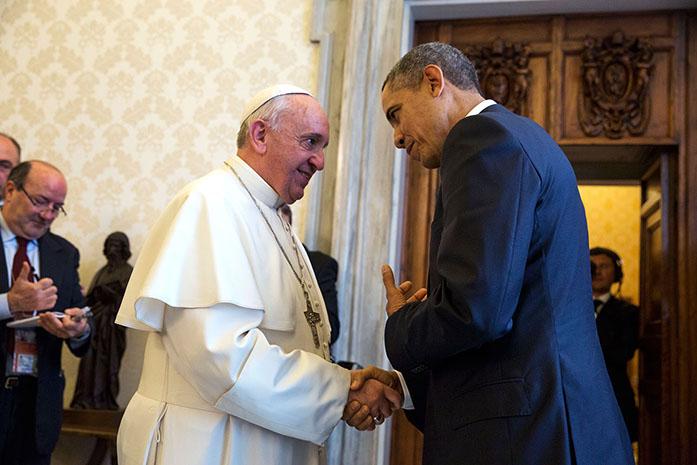Jace Brady
[email protected]
The pope is about 500 years too late for the role he is trying to play in society. Modern popes have consistently been moral leaders who focused on church teachings and moral behavior. Pope Francis, however, has changed roles and has set off on a crusade to influence public policy around the world. While the Catholic Church was the leader of the political world for hundreds of years, today we prefer a separation of church and state.
The Founding Fathers lived in a time where religion and politics were much more intertwined. Many early Americans were descendants of pilgrims trying to escape the bastille of state religion. Having seen the dismay and subjugation imposed on the citizenry when these two institutions combine, the Founding Fathers insisted on a separation of church and state in the U.S. Constitution. Since that time, we have asserted that churches be separate from the government, and the government often subjugated religion when religious practices did not comply with the laws of the land.
Today, religion is attempting to creep back into control and influence in government affairs, and Francis is its champion. While I am sure the pope has no nefarious intentions, he takes his positions too far. Suggesting that we support the poor through charitable giving is certainly within the purview of the pope’s moral authority. However, suggesting that governments intervene and redistribute wealth in socialistic manner crosses the line or morality and policy. I, too, believe that we should care for the indigent among us, and I vote for elected leaders who agree with me in the way this should be done. The pope attempting to influence elected leaders compromises the power of my vote and diminishes the sovereignty of our nation. The pope should limit his comments on poverty to encouraging Catholics and those disposed to listen to the pope to give more to charity or to take care of the planet that we have been blessed with. When he encourages governments to create laws to punish industries that do not meet certain pollution standards, he has gone too far.
Of course, the pope isn’t the only leader, nor Catholicism the only religion, that inappropriately attempts to influence political outcomes. In 2008, many religions banded together to support Proposition 8, which outlawed gay marriage, in California. They donated millions of dollars and effectively influenced popular opinion to vote against equal access to marriage. Again, religions are welcome to preach moral principles that they believe will benefit society, but society must be able to ultimately decide for itself unencumbered.
Religion plays an important role in our society, but we have separated it from our government with good reason. While those who agree with the pope’s positions today may disagree with my argument, how will you feel if the next pope tries to persuade governments to defund abortion clinics because it contradicts church policy or to outlaw divorce? It is easy to support the pope influencing government actions when you agree with what he says, but much more difficult to look into the future and realize the possible repercussions. I am sure the pope is a much better man than me who is trying to make the world a better place, but he should do so from the venue and within the purview to which he has been assigned, the Vatican.



